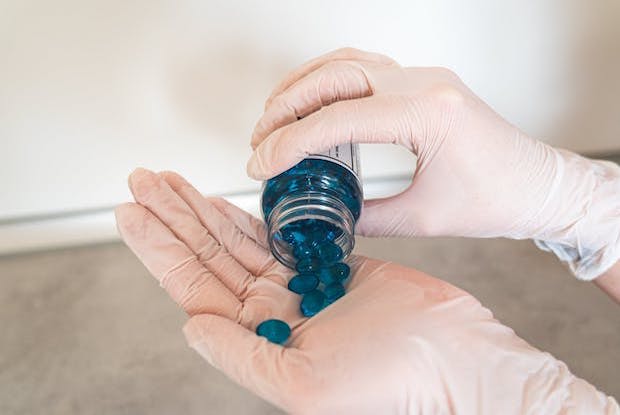Table of Contents
b. Other People with Infections
d. Medical Tests and Vaccinations
e. Pregnancy and Breastfeeding
What is Hydrea?
Hydrea (hydroxyurea) is a prescription medication that is used to treat several different forms of cancer. Hydroxyurea is an anti-cancer chemotherapy drug and is commonly used to treat sickle cell anemia, essential thrombocytosis, melanoma, polycythemia vera, chronic myeloid leukemia, refractory ovarian cancer, and cancers of the head and neck. [1]
Hydroxyurea is a myelosuppressive medication. The drug works by reducing the number of blood cells that bone marrow produces. By suppressing the production of blood cells, it gives the body’s immune system, or other medications, a better chance to fight the cancerous cells. Hydrea lowers the number of red blood cells, white blood cells, and platelets. [2] There are also other benefits to Hydrea. This drug also increases the amount of fetal hemoglobin (Hb F) in red blood cells, can shrink an enlarged spleen, and reduces the risk of blood clots. [3] [4] [5]
Hydrea is a very versatile anti-cancer medication. However, there are some unfortunate interactions between Hydrea and other substances. Keep reading to learn about these interactions and things you should avoid while taking this medication.
Get savings updates for Hydrea
What to Avoid While Taking Hydrea
All medications interact with other substances. No matter the reason you have been prescribed hydroxyurea, you should be aware of the interactions. By limiting or avoiding these substances, you can help your medication be more effective.
a. Certain Medications
Hydrea can interact with some other medications and cause severe side effects. It is important that your doctor is aware of your medical history before prescribing any medications for you. In particular, you need to alert your doctor if you are taking any antiviral medications, such as didanosine or stavudine or an interferon drug. [6] [7]
However, to be on the safe side, you should tell your doctor about all of the medications that you take, including prescription, over-the-counter drugs, and any vitamins or herbal products that you use. Hydroxyurea works by reducing the production of blood cells by the bone marrow. However, by lowering the number of white blood cells, Hydrea can weaken your immune system. This can make it more likely to catch or develop other infections. While taking Hydrea, you should avoid being physically close to people that are sick or have infections. If you do begin to show any signs of an infection such as fever, chills, shortness of breath, unusual bleeding or easy bruising, then you should call your doctor immediately. [8] While taking hydroxyurea, it is important that you limit your exposure to sunlight. This antiviral drug may increase the risk of developing skin cancer. Whenever you are outdoors, you should try to find shade. It is also advisable to wear body-covering protective clothing and use a high SPF-level (30+) sunscreen. [6] Hydrea can interfere with the results of certain medical laboratory tests. You should not avoid these tests on the basis of taking Hydrea. However, it is important that you inform all of your doctors or any testing personnel that you are using hydroxyurea. [9] As previously mentioned, this drug can weaken your immune system. You should not receive any “live” vaccines while you are taking Hydrea. This includes vaccinations such as chickenpox, measles, influenza, mumps or rubella. Receiving a “live” vaccine can increase the risk of developing a serious infection. [6] Hydroxyurea works to treat cancerous conditions by affecting the production of cells. Due to this suppressive effect, Hydrea should not be taken during pregnancy. Either parent taking this medication can cause birth defects in an unborn baby. Therefore, both men and women that take this drug should use appropriate methods of birth control throughout their treatment. [8] Women of childbearing age should continue to use birth control for at least six months after treatment. Men that have a partner of childbearing age should use effective birth control for the year after ending treatment. Women that are breastfeeding or wish to start breastfeeding should speak to their doctor about the benefits and disadvantages of using this drug. This drug does pass into breast milk and may cause unwanted effects in a nursing child. Almost all medications can cause side effects. The range and severity of side effects depend on a number of factors, including the patient’s health, age, organ function, and alcohol intake. Older adults may be more sensitive to the side effects of Hydrea. Common side effects of Hydrea include: Hydroxyurea may also cause more severe side effects. You should seek medical assistance if you experience any of the following: The content in this article is intended for informational purposes only. This website does not provide medical advice. In all circumstances, you should always seek the advice of your physician and/or other qualified health professionals(s) for drug, medical condition, or treatment advice. The content provided on this website is not a substitute for professional medical advice, diagnosis, or treatment.
b. Other People with Infections

c. Sunlight and Similar
d. Medical Tests and Vaccinations
e. Pregnancy and Breastfeeding
Side Effects of Hydrea

